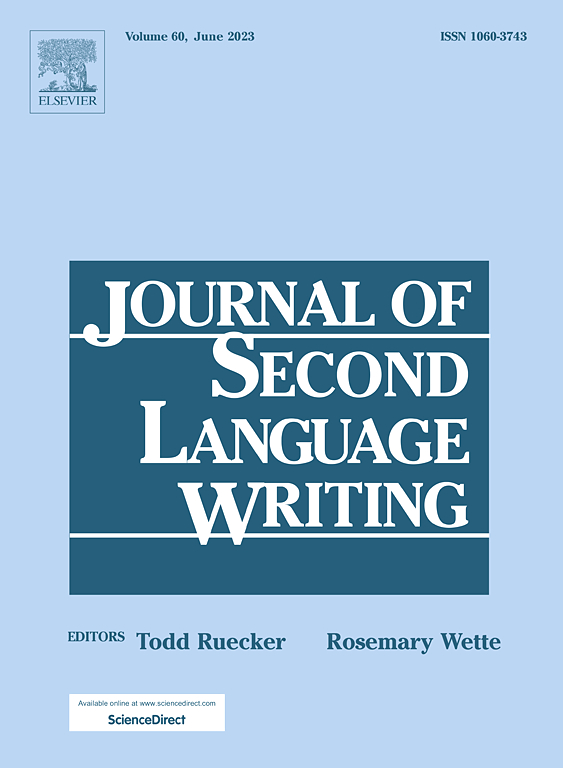通过数字多模态写作促进第二语言写作自主
IF 4.5
1区 文学
Q1 LINGUISTICS
引用次数: 0
摘要
已有研究考察了学生在数字多模态写作中的自主语言学习行为。然而,是否可以通过DMC促进第二语言(L2)写作自主权仍未得到充分探讨。本研究在中国一所医科大学进行,调查了三名二年级医学生在为期一年的DMC项目中外语写作自主性的变化。二语写作自主性是学生成为具有社会责任感的有策略的、有效的二语作者的关键因素。数据收集自观察、访谈、反思日志和学生撰写的DMC项目。通过比较DMC项目前后学生的二语写作目的、感受和行为,可以发现学生二语写作自主性的变化。通过主题和多模态分析综合了这些变化的中介因素。分析表明,DMC中真实的写作任务、协作形式和多模态混合提供的启示促进了学生在二语写作中的参与意愿、写作能力和实验自由。这些因素最终形成了二语写作自主性的三个领域的变化:二语写作学习者的自主性、二语写作使用者的自主性和二语写作者的自主性。本研究提供了一种基于证据的DMC教学模式,旨在提高学生的二语写作自主性。本文章由计算机程序翻译,如有差异,请以英文原文为准。
Promoting second language writing autonomy through digital multimodal composing
Previous studies have examined students’ autonomous language learning behaviors in digital multimodal composing (DMC). However, whether second language (L2) writing autonomy can be promoted through DMC remains underexplored. This study, conducted at a medical university in China, investigated changes in three second-year medical students’ L2 writing autonomy during a year-long DMC project. L2 writing autonomy is a pivotal factor in the students’ becoming strategic and effective L2 writers with a sense of social responsibility. Data were collected from observation, interviews, reflective journals, and student-authored DMC projects. Changes in the students’ L2 writing autonomy were identified by comparing their L2 writing purposes, feelings, and behaviors before and after the DMC projects. The factors mediating these changes were synthesized through thematic and multimodal analysis. The analysis revealed that the affordances provided by the authentic writing task, collaborative form, and multimodal remixing in DMC promoted the students’ willingness to engage, ability to compose, and freedom to experiment in L2 writing. These factors ultimately shaped changes in three domains of L2 writing autonomy: autonomy as L2 writing learners, autonomy as L2 writing users, and autonomy as L2 writers. The study provides an evidence-based pedagogical model of DMC aimed at promoting students’ L2 writing autonomy.
求助全文
通过发布文献求助,成功后即可免费获取论文全文。
去求助
来源期刊

Journal of Second Language Writing
LINGUISTICS-
CiteScore
8.80
自引率
13.10%
发文量
50
审稿时长
59 days
期刊介绍:
The Journal of Second Language Writing is devoted to publishing theoretically grounded reports of research and discussions that represent a significant contribution to current understandings of central issues in second and foreign language writing and writing instruction. Some areas of interest are personal characteristics and attitudes of L2 writers, L2 writers'' composing processes, features of L2 writers'' texts, readers'' responses to L2 writing, assessment/evaluation of L2 writing, contexts (cultural, social, political, institutional) for L2 writing, and any other topic clearly relevant to L2 writing theory, research, or instruction.
 求助内容:
求助内容: 应助结果提醒方式:
应助结果提醒方式:


